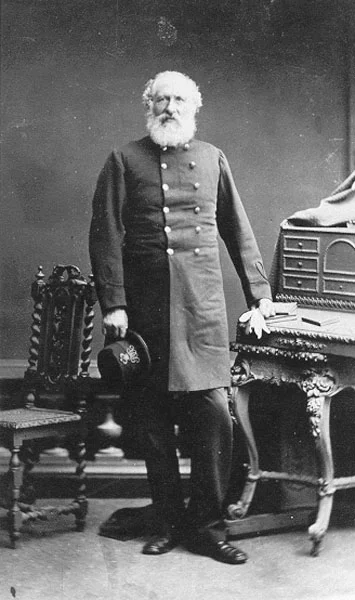Thomas J. Nevin's mugshot of prisoner Denis Dogherty, 1870s,
Surname is spelled Dougherty by Edwin Barnard in Exiled: The Port Arthur Convict Photographs NLA (2010). Photos copyright © KLW NFC 2011 ARR. Watermarked.
Video excerpt from:
ABC TV (Aust) news report by Siobhan Heanue, 2 April 2011.
NB: this report contains unfactual and erroneous statements by both the journalist and interviewee.
For authentic and accurate research, see this article which reviews the National Library of Australia's book published with author accreditation to Edwin Barnard, titled Exiled: The Port Arthur Convict Photographs (2010), noting specific examples of Barnard's suppositions, prevarications, errors and omissions.
► Thomas FRANCIS was photographed by T. J. Nevin on 6th February 1874
See also:
And search convicts' names with T. J. Nevin's photographs at these weblogs:
See also this critique of the book by Tim Causer, Bentham Project, University College London.
The interviewee Edwin Barnard in this ABC news report poses here as an expert on the Tasmanian convicts photographs taken and produced by commercial and police photographer Thomas J. NEVIN in the 1870s. Original duplicates of these same mugshots held at the NLA which were made by Thomas Nevin and his brother Constable John Nevin for the police are held in other public institutions (TMAG, QVMAG, AOT, SLNSW, PCHS) and private collections.
George Langley and Denis Dogherty are two prisoners mentioned in this excerpt from an ABC TV (Aust) news report delivered by Siobhan Heanue, 2 April 2011. Langley's and Dogherty's photos are just two of thousands of prisoner mugshots taken by the Nevin brothers, professional photographer Thomas Nevin (1842-1923) and his brother Constable John Nevin (1852-1891) at the Hobart Gaol between 1872 and 1886. About 300 of their Tasmanian prisoner photographs survive in public collections. Barnard's various unsubstantiated assertions - eg. that Denis Dogherty never saw his own mugshot - underscore the shallow modus operandi which characterises his self-presentation as an expert. Edwin Barnard simply repeats the simplistic nuances of a faded postmodern discourse on power marshalled in the 1990s by photohistorians such as Helen Ennis and Isobel Crombie.
HIDDEN in FULL VIEW
Barnard claims to be the "author" of the recent publication featuring Nevin's prisoner mugshots titled Exiled: The Port Arthur Convict Photographs (2010) sponsored by the National Library of Australia, but the facts remain and are widely known that Barnard liberally appropriated materials three years ago from our weblogs and albums documenting Thomas J. Nevin's commercial and police work. The weblogs have presented accurate research about Nevin's commission with the Hobart Gaol and Municipal Police Office online since 2005, yet Barnard used the research without due contact or courtesy in any form. Earlier in the interview Barnard claims he "discovered" and "unearthed" these mugshots despite and in the face of their public visibility since 1977 when they were exhibited at the QVMAG, researched and curated by experts, and despite the constant online visibility at the Archives Office Tasmania and the National Library of Australia since the early 1990s with full and unequivocal attribution to T.J. Nevin.
On April 8th, 2011, Edwin Barnard made an appearance at the National Library of Australia during a weekend conference called True Stories: Writing History. In his talk, Barnard conceded that the so-called "Port Arthur convict photographs" which feature in the NLA publication Exiled: The Port Arthur Convict Photographs (2010) were taken at the Hobart Gaol and not at Port Arthur, though he did not explicitly name Thomas Nevin as the photographer, despite the facts available, which would have redeemed him to some extent. But then, when requested by an audience member to recite what he had written about the convict Denis Dogherty, he quoted verbatim the material we published on these weblogs way back in 2006 and duly basked in the audience's warm response. It's a sad comment, but there are self-promoting hacks such as Barnard (and others like Julia Clark) who crave love and validation through coveting the legacy of others.








